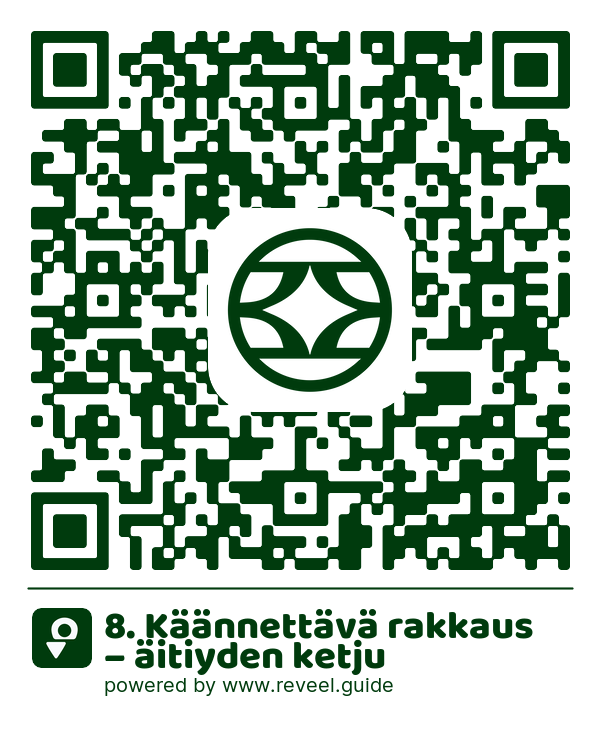
8. Käännettävä rakkaus – äitiyden ketju

8. Käännettävä rakkaus – äitiyden ketju
Elli Hukka / "Reversible Love: Chain of Motherhood"
Necklace: Matryoshka, paint, printed cotton fabric, beeswax, silver, turquoise bead
Brooch: Matryoshka, paint, printed cotton fabric, beeswax, silver, turquoise bead, steel wire
The key themes of this work are the complex relationships between mothers and daughters, finding one’s own path, and the freedom to settle into oneself. Books, stories, and memories fragment as life unfolds, and from these pieces, a new whole is built.
Bo Ram Jung
I’m from South Korea. My hometown is surrounded by tall mountains, and it was extremely hot in the summers. Older people’s mindsets stayed the same, while the young grew restless and moved to bigger cities. I graduated with a bachelor's in business administration from Seoul and worked for a few years. I lived in Russia, in Vladivostok and Moscow, for about eight years in total, studying and working. I met my future husband in St. Petersburg while attending a master's course in international economics.
My husband is from Turku, and our daughter was born there. We lived in Korea for a few months and in Russia for a few years. We eventually settled in Finland because we wanted to provide our daughter with the safest environment, the best childhood memories, and a good education. My husband’s family and childhood friends offered us a vital support network in our choice of where to live.
I believe equality means not judging others unless asked to do so. Often, our assessments are influenced by prejudice and misunderstandings, which can easily hurt people, even if that was not the intention.
Even though I’ve lived in Finland for many years and am now a Finnish citizen, I look foreign, and people often start conversations with me in English without asking my preference. Sometimes, people explain certain words in a childish manner, assuming that they are too difficult for me. The intention is polite, but at times I feel like an outsider. I also think about how hurtful this can be for the next generations of immigrants or adopted children, whose identity is almost or entirely Finnish, even if their appearance suggests otherwise.
Finland would be a better place if people from different places could feel a sense of belonging, not only those from abroad but also people from different parts of the country or different cities.
My husband loves Korean food, and my daughter’s favorite is K-pop. She thinks Korea has many cool stores and is eagerly awaiting our next trip there. She watches Korean series with Finnish subtitles. At home, we speak Finnish, but my husband can read Korean, and I’ve been teaching my daughter Hangul (Korean alphabet) in the evenings.
My language skills and previous work experience played a crucial role in my employment in Korea, Russia, and Finland. During my pregnancy and while breastfeeding, I attended Finnish language courses at the workers' institute, university of applied sciences, and evening school. I passed the intermediate YKI test about ten months after moving here, and later I achieved top-level scores in two parts of the YKI test.
I’m in my 40s, a Turku resident, and the mother of an almost-teenage elementary school student. I work as an accountant for an international company. Most of my colleagues are male engineers, so our interests may differ, but I find our discussions fascinating.
A hobby close to my heart is translating literature. I have translated more than fifteen books from Finnish to Korean, including children’s and young adult books, non-fiction, and poetry. Translating an adult novel is one of my biggest dreams.
I’m a culture enthusiast. Museums and theaters are my favorite places, and perhaps the Turku main library is my soul’s home. I go there weekly to borrow books and read magazines. I also enjoy exhibitions and club activities. A few years ago, I participated in multilingual activities at the library, where I introduced Korean culture through language, music, and a puppet show for people living in Finland. My daughter was proud of her mom!
Books I Recommend on Immigration
Min Jin Lee, Pachinko (English or Swedish)
Miika Nousiainen, Vadelmavenepakolainen (Otava)
Pajtim Statovci, Kissani Jugoslavia (Otava)
Quynh Tran, Varjo ja viileys (Skugga och svalka), (Teos)
Ranya ElRamly (now Paasonen), Auringon asema (Otava)
Riad Sattouf, Tulevaisuuden arabi (L'Arabe du futur) 1–6, (WSOY)

